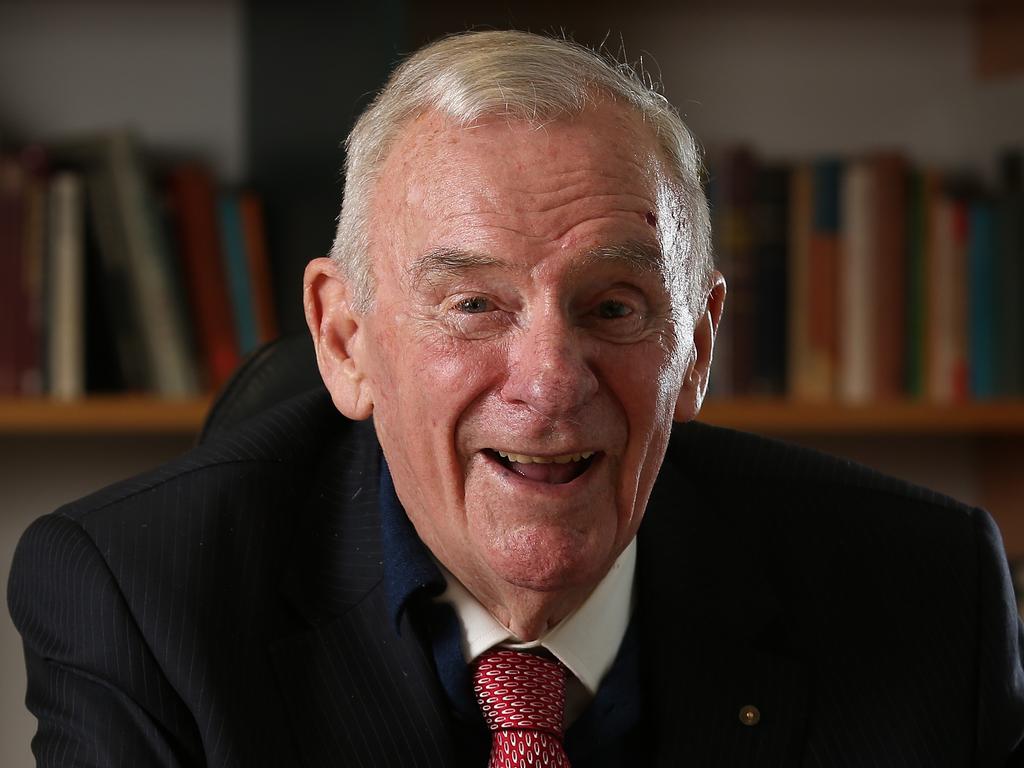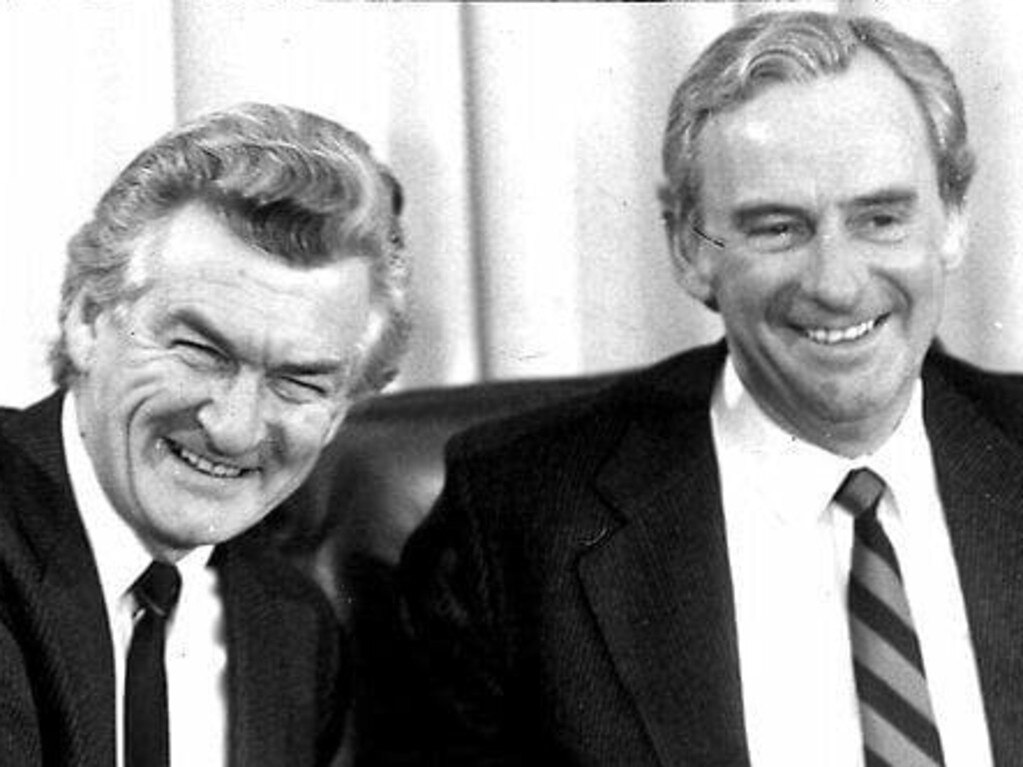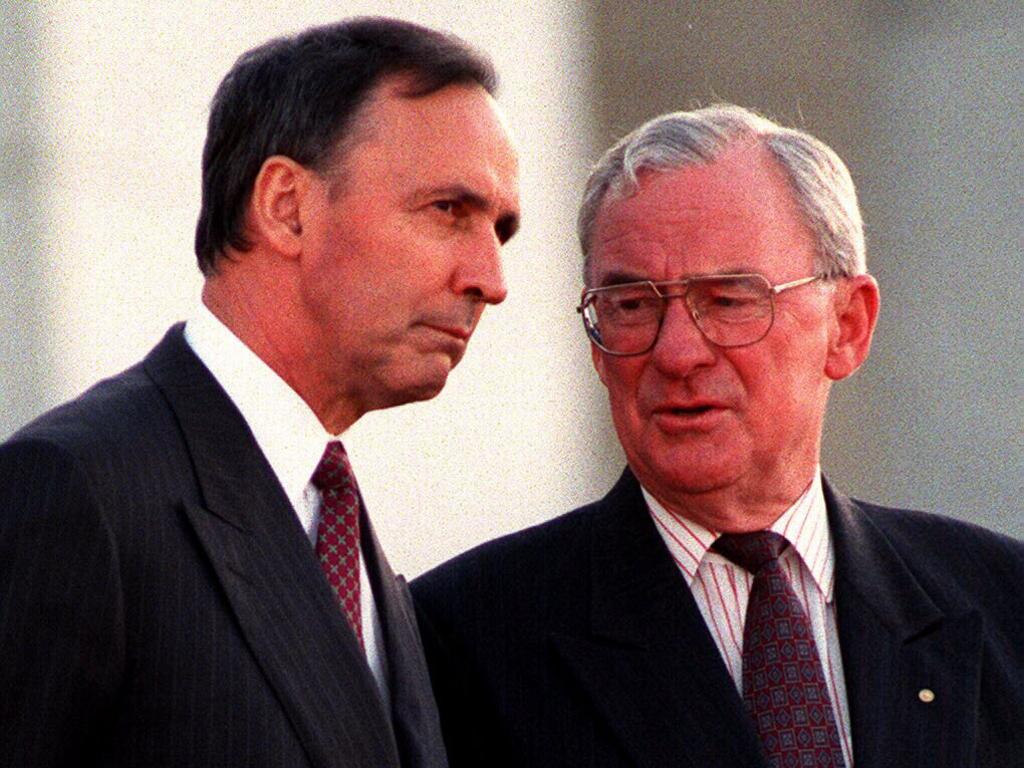
The most agonising day of his political life was that moment of high drama on February 3, 1983, when Hayden resigned the ALP leadership in favour of Bob Hawke – despite his belief that he would have won the subsequent election against Malcolm Fraser.
History has vindicated Hayden’s sacrificial resignation decision but that is not to deny his belief he would have won. Hayden failed in a personal sense to become prime minister. However, his five-year leadership of the Labor Party (1978-83) was a success, not a failure, for the Labor Party and Australia.
Hayden took a broken party, spearheaded a series of policy changes, and handed over to Hawke a party ready and equipped to govern.
He was the outstanding minister in the Whitlam government, the driving architect of Medibank – the model of universal health insurance – probably the single most far-reaching social reform since World War II. Hayden’s agenda of structural and policy reforms when he was opposition leader made him second only to Gough Whitlam in the post-war period as an architect of Labor Party modernisation.
The final stage of his career saw Hayden complete an extraordinary quartet of high public duty – treasurer, opposition leader, foreign minister and governor-general.
The cycle of Bill’s life reveals why Australia is such a great country. Hayden was a child of the Depression, born in 1933, its second worst year, and saw his family broken by its impact. His father was a drunk, a violent abuser of his mother and an illegal immigrant. Bill slept on an open veranda, summer or winter. But he absorbed working-class virtue – hard work, self-improvement and personal discipline.
He started as a Queensland cop, studied at night and matriculated, met a woman in the street at Ipswich and married Dallas – calling that his best decision – joined the Labor Party, got elected aged 28 at the 1961 federal election and then had his first plane trip – flying to Canberra to take his seat in the House of Representatives. From the start he was plagued by self-doubt, the curse of his life.
Hayden was different and an outsider. He saw the thuggery of Labor politics and built his resilience – nobody was going to push Hayden around. He decided the Liberals were overrated, Labor was its own worst enemy and, after getting his economics degree part-time, realised our economy was deeply vulnerable.

Hayden was on the left but saw the obvious – that Labor’s future, indeed its survival, depended on Whitlam. He became a Whitlamite. After 1972 in a cabinet of old men Hayden was a rationalist and a fighter. He pioneered the single mothers’ pension and led the campaign for Medibank in a brutal encounter against the Coalition parties, the doctors and the health insurance industry amid hysteria about nationalisation of medicine. Hayden’s performance remains an epic study in successful reform against established power.
Whitlam’s folly was to wait until mid-1975 to make him treasurer. If he had been treasurer in late 1974 Hayden, of course, would have refused to sign the $4bn Khemlani-driven overseas loan authorisation that was pivotal in ruining the government.
Hayden had an inquiring mind. He was interested in ideas. He had an intellectual range that would humble most of today’s politicians. Devoid of charisma and sophistication, Bill built himself as relentlessly as a bricklayer builds a house. He was suspicious of the orthodoxy, always growing, a student of life’s complexities – he loved the Whitlam government and admired Gough yet he became the most important critic of the Whitlam government and Gough’s flaws.
Bill was self-critical and a worrier, totally driven, self-made, tough-minded yet compassionate, always unpretentious, made ruthless by Malcolm Fraser’s ruthlessness, his background vested him with a burning belief in social justice and public duty. After the 1975 election humiliation he retreated, then emerged to challenge Whitlam, lost 32-30 but guaranteed his succession to the leadership.

Not a born leader, Hayden made himself into a leader. As leader he authorised the ALP-ACTU Prices and Incomes Accord, guided Labor on to a post-Whitlam trajectory and, above all, demanded the party slay its dinosaurs. In his defining speech to the 1979 national conference, Hayden told the party: “We will not find our future in the past. First, and above all else, we must demonstrate beyond doubt that we are competent economic managers. That competence, and the public’s recognition of it, is the absolute essential underpinning of everything we want to do.”
Hayden came close to victory at the 1980 election, winning 49.6 per cent of the two-party preferred vote. But the big story was the remaking of Labor with the help of a new generation that believed in Hayden but eventually, reluctantly, went to Hawke.
Hayden’s peculiar plight was that he relied on centre-left votes as leader and centre-right votes for policy. He loathed the factions and the factions often reciprocated. Hawke and Hayden were personality opposites. The Labor caucus 1980-83 was a whirlpool of emotion with the senior correspondents caught up in a protracted, emotional struggle, a rivalry between two men, both deserving to be leader. Hayden was never intimidated by Hawke’s intellect but remained astounded by his political magnetism and supreme egoism.
Watching Hawke, Bill would just shake his head, he knew he wasn’t like that; he couldn’t be like that. Hayden had strength; Hawke had magic. Paul Keating had championed Hayden before, agonisingly, moving to back Hawke. Bill and Dallas were moved by Keating’s 2017 Hayden Oration, a deep historical tribute and accounting, when Keating said the remaking of Australian policy had begun the day Bill convened his first shadow cabinet meeting as leader.

In the end, Labor could not deny Hawke – and neither could Bill. As John Button told him, the party was desperate to win the 1983 election. When Hayden resigned he was a ruthless professional negotiating his terms with Hawke. That morning in Brisbane they wept together, but for different reasons.
Yet Hayden still had a long career ahead. As foreign minister he was diligent and responsible, backing an independent Australia within the US alliance, pioneering a series of initiatives in Asia and supporting Keating’s epic economic reforms.
As governor-general, Bill and Dallas were warm-hearted, opening Yarralumla to many, never forgetting where they came from and, in the final years, returning to Ipswich, supported by family, fighting ill-health but having lived a truly remarkable Australian life.








Bill Hayden deserved to be our prime minister. He was a courageous, tough and intellectually formidable figure. The list of his achievements is daunting, but one deserves to be highlighted – Hayden was the key figure in the transformation of the Labor Party from the Whitlam to Hawke eras.